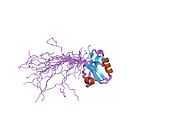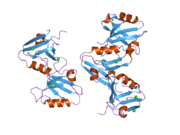PDLIM5
| PDZ and LIM domain 5 | |||||||||||||
|---|---|---|---|---|---|---|---|---|---|---|---|---|---|
 PDB rendering based on 1wf7. | |||||||||||||
| |||||||||||||
| Identifiers | |||||||||||||
| Symbols | PDLIM5 ; ENH; ENH1; LIM | ||||||||||||
| External IDs | OMIM: 605904 MGI: 1927489 HomoloGene: 21289 GeneCards: PDLIM5 Gene | ||||||||||||
| |||||||||||||
| RNA expression pattern | |||||||||||||
 | |||||||||||||
 | |||||||||||||
 | |||||||||||||
| More reference expression data | |||||||||||||
| Orthologs | |||||||||||||
| Species | Human | Mouse | |||||||||||
| Entrez | 10611 | 56376 | |||||||||||
| Ensembl | ENSG00000163110 | ENSMUSG00000028273 | |||||||||||
| UniProt | Q96HC4 | Q8CI51 | |||||||||||
| RefSeq (mRNA) | NM_001011513 | NM_001190852 | |||||||||||
| RefSeq (protein) | NP_001011513 | NP_001177781 | |||||||||||
| Location (UCSC) | Chr 4: 95.37 – 95.59 Mb | Chr 3: 142.24 – 142.4 Mb | |||||||||||
| PubMed search | |||||||||||||
PDZ and LIM domain protein 5 is a protein that in humans is encoded by the PDLIM5 gene.[1][2]
The protein encoded by this gene is a LIM domain protein. LIM domains are cysteine-rich double zinc fingers composed of 50 to 60 amino acids that are involved in protein-protein interactions. LIM domain-containing proteins are scaffolds for the formation of multiprotein complexes. The proteins are involved in cytoskeleton organization, cell lineage specification, organ development, and oncogenesis. The encoded protein is also a member of the Enigma class of proteins, a family of proteins that possess a 100-amino acid PDZ domain in the N terminus and 1 to 3 LIM domains in the C terminus. Multiple transcript variants encoding different isoforms have been found for this gene, although not all of them have been fully characterized.[2]
Interactions
PDLIM5 has been shown to interact with PRKCB1.[3]
References
- ↑ Wu M, Li Y, Ji C, Xu J, Zheng H, Zou X, Gu S, Lou Y, Xie Y, Mao Y (September 2004). "Cloning and identification of a novel human gene PDLIM5, a homolog of AD-associated neuronal thread protein (AD7c-NTP)". DNA Seq 15 (2): 144–7. doi:10.1080/10425170310001656756. PMID 15346770.
- ↑ 2.0 2.1 "Entrez Gene: PDLIM5 PDZ and LIM domain 5".
- ↑ Kuroda, S; Tokunaga C; Kiyohara Y; Higuchi O; Konishi H; Mizuno K; Gill G N; Kikkawa U (December 1996). "Protein-protein interaction of zinc finger LIM domains with protein kinase C". J. Biol. Chem. (UNITED STATES) 271 (49): 31029–32. doi:10.1074/jbc.271.49.31029. ISSN 0021-9258. PMID 8940095.
Further reading
- Sudo K, Chinen K, Nakamura Y (1995). "2058 expressed sequence tags (ESTs) from a human fetal lung cDNA library". Genomics 24 (2): 276–9. doi:10.1006/geno.1994.1616. PMID 7698749.
- Bonaldo MF, Lennon G, Soares MB (1997). "Normalization and subtraction: two approaches to facilitate gene discovery". Genome Res. 6 (9): 791–806. doi:10.1101/gr.6.9.791. PMID 8889548.
- Kuroda S; Tokunaga C; Kiyohara Y et al. (1997). "Protein-protein interaction of zinc finger LIM domains with protein kinase C". J. Biol. Chem. 271 (49): 31029–32. doi:10.1074/jbc.271.49.31029. PMID 8940095.
- Ueki N; Seki N; Yano K et al. (1999). "Isolation, tissue expression, and chromosomal assignment of a human LIM protein gene, showing homology to rat enigma homologue (ENH)". J. Hum. Genet. 44 (4): 256–60. doi:10.1007/s100380050155. PMID 10429367.
- Nakagawa N; Hoshijima M; Oyasu M et al. (2000). "ENH, containing PDZ and LIM domains, heart/skeletal muscle-specific protein, associates with cytoskeletal proteins through the PDZ domain". Biochem. Biophys. Res. Commun. 272 (2): 505–12. doi:10.1006/bbrc.2000.2787. PMID 10833443.
- Hartley JL, Temple GF, Brasch MA (2001). "DNA Cloning Using In Vitro Site-Specific Recombination". Genome Res. 10 (11): 1788–95. doi:10.1101/gr.143000. PMC 310948. PMID 11076863.
- Wiemann S; Weil B; Wellenreuther R et al. (2001). "Toward a Catalog of Human Genes and Proteins: Sequencing and Analysis of 500 Novel Complete Protein Coding Human cDNAs". Genome Res. 11 (3): 422–35. doi:10.1101/gr.GR1547R. PMC 311072. PMID 11230166.
- Simpson JC; Wellenreuther R; Poustka A et al. (2001). "Systematic subcellular localization of novel proteins identified by large-scale cDNA sequencing". EMBO Rep. 1 (3): 287–92. doi:10.1093/embo-reports/kvd058. PMC 1083732. PMID 11256614.
- Strausberg RL; Feingold EA; Grouse LH et al. (2003). "Generation and initial analysis of more than 15,000 full-length human and mouse cDNA sequences". Proc. Natl. Acad. Sci. U.S.A. 99 (26): 16899–903. doi:10.1073/pnas.242603899. PMC 139241. PMID 12477932.
- Maeno-Hikichi Y; Chang S; Matsumura K et al. (2003). "A PKC epsilon-ENH-channel complex specifically modulates N-type Ca2+ channels". Nat. Neurosci. 6 (5): 468–75. doi:10.1038/nn1041. PMID 12665800.
- Iwamoto K; Kakiuchi C; Bundo M et al. (2004). "Molecular characterization of bipolar disorder by comparing gene expression profiles of postmortem brains of major mental disorders". Mol. Psychiatry 9 (4): 406–16. doi:10.1038/sj.mp.4001437. PMID 14743183.
- Petroziello J; Yamane A; Westendorf L et al. (2004). "Suppression subtractive hybridization and expression profiling identifies a unique set of genes overexpressed in non-small-cell lung cancer". Oncogene 23 (46): 7734–45. doi:10.1038/sj.onc.1207921. PMID 15334068.
- Iwamoto K; Bundo M; Washizuka S et al. (2004). "Expression of HSPF1 and LIM in the lymphoblastoid cells derived from patients with bipolar disorder and schizophrenia". J. Hum. Genet. 49 (5): 227–31. doi:10.1007/s10038-004-0136-5. PMID 15362566.
- Gerhard DS; Wagner L; Feingold EA et al. (2004). "The Status, Quality, and Expansion of the NIH Full-Length cDNA Project: The Mammalian Gene Collection (MGC)". Genome Res. 14 (10B): 2121–7. doi:10.1101/gr.2596504. PMC 528928. PMID 15489334.
- Wiemann S; Arlt D; Huber W et al. (2004). "From ORFeome to Biology: A Functional Genomics Pipeline". Genome Res. 14 (10B): 2136–44. doi:10.1101/gr.2576704. PMC 528930. PMID 15489336.
- Niederländer N, Fayein NA, Auffray C, Pomiès P (2005). "Characterization of a new human isoform of the enigma homolog family specifically expressed in skeletal muscle". Biochem. Biophys. Res. Commun. 325 (4): 1304–11. doi:10.1016/j.bbrc.2004.10.178. PMID 15555569.
- Kato T; Iwayama Y; Kakiuchi C et al. (2005). "Gene expression and association analyses of LIM (PDLIM5) in bipolar disorder and schizophrenia". Mol. Psychiatry 10 (11): 1045–55. doi:10.1038/sj.mp.4001719. PMID 16044170.
- Rual JF; Venkatesan K; Hao T et al. (2005). "Towards a proteome-scale map of the human protein-protein interaction network". Nature 437 (7062): 1173–8. doi:10.1038/nature04209. PMID 16189514.
- Horiuchi Y; Arai M; Niizato K et al. (2006). "A polymorphism in the PDLIM5 gene associated with gene expression and schizophrenia". Biol. Psychiatry 59 (5): 434–9. doi:10.1016/j.biopsych.2005.07.041. PMID 16213469.
| |||||||||||||


